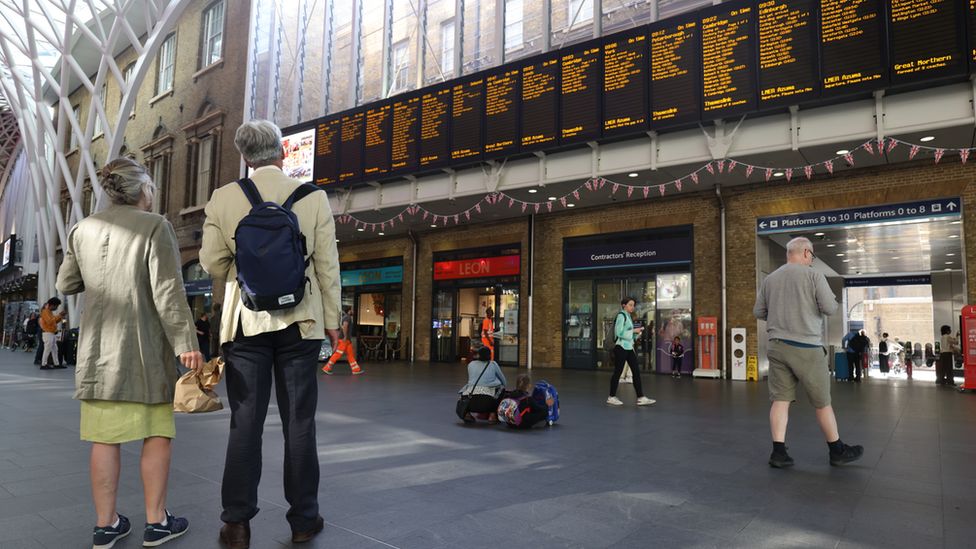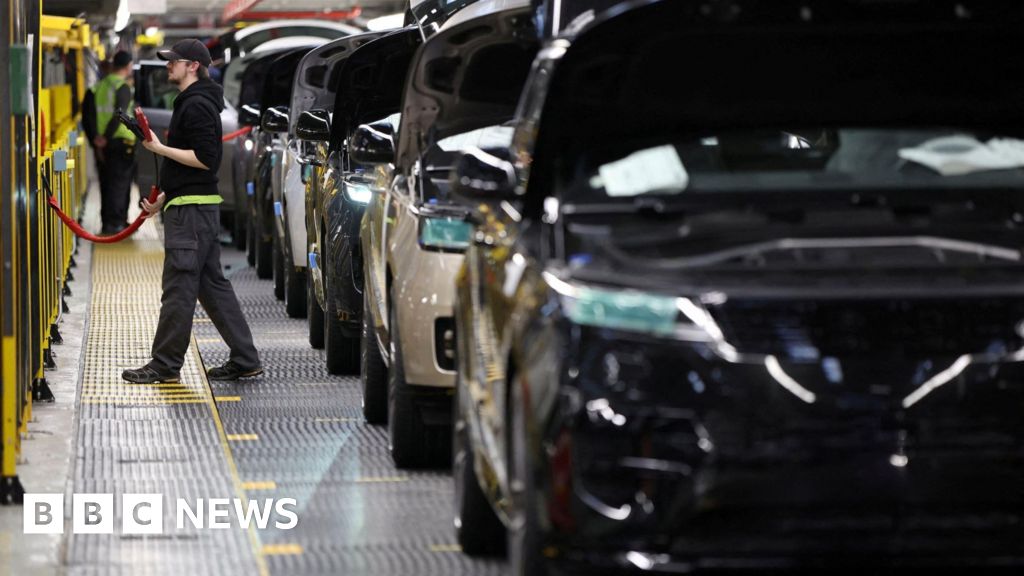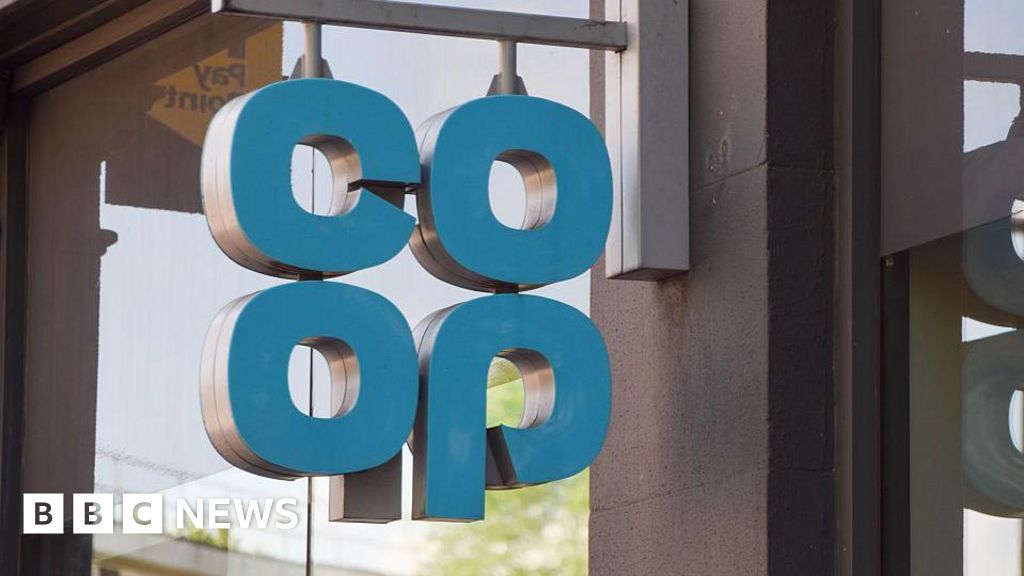ARTICLE AD BOX
By Charley Adams & Andre Rhoden-Paul
BBC News
 Image source, PA Media
Image source, PA Media
Services started later than normal on Wednesday as trains were delayed depots
The rail strike on Thursday will go ahead after talks between the RMT union and railway employers broke down.
The RMT accused Transport Secretary Grant Shapps of "wrecking" negotiations by refusing to allow Network Rail to withdraw redundancy threats.
Millions of people were affected on Tuesday in the first day of the largest strike in decades, with another walkout also due on Saturday.
Only 60% of trains are currently running due to the knock-on effects.
Mick Lynch, general secretary of the Rail, Maritime and Transport workers union, said hours of talks on Wednesday broke down without agreement.
He said: "Grant Shapps has wrecked these negotiations by not allowing Network Rail to withdraw their letter threatening redundancy for 2,900 of our members.
"Until the government unshackle Network Rail and the train operating companies, it is not going to be possible for a negotiated settlement to be agreed."
He said the industrial action with continue until the unions gets a deal giving job security and a pay rise that "deals with the escalating cost of living crisis".
Speaking on BBC Breakfast earlier, Network Rail's chief negotiator Tim Shoveller stressed there was "still time for talking".
"It's really important we continue to stress the fact there is no need to have a strike. It doesn't help," he said.
"The fact there is a strike means that we lose money in the industry, as well as upsetting our passengers and causing disruption to the wider economy.
"So a really key objective for me is to make sure we get these strikes called off at the earliest possible opportunity."
Image source, PA Media
Image caption,A man walks through an empty concourse in London's Waterloo Station
Thursday's strike is set to be identical to the first day of action in terms of impact, with half of the network closed and only 20% of services running with some areas having no trains at all.
It will coincide with a yellow Met Office weather warning for a thunderstorm across much of southern England on Thursday, which could further hamper travel plans.
With 48 hours' notice, disruption on Saturday could be avoided if a deal is agreed, it is understood.
At Prime Minister's Questions on Wednesday afternoon, Labour leader Sir Keir Starmer accused Boris Johnson and Transport Secretary Grant Shapps of not "lifting a finger" to stop the strikes.
He told the Commons: "The prime minister of this country and his transport secretary haven't attended a single meeting, held a conversation or lifted a finger to stop these strikes...
"So rather than blame everyone else why doesn't he do his job, get round the table and get the trains running?"
Mr Johnson responded that the government was doing "everything we can to prevent these strikes" and it was up to the railway companies to negotiate.
He said 25 Labour MPs having joined picket lines to back strikers was "a disgrace" and accused Sir Keir of not having the "gumption to speak out against the rail strikes".
Image source, PA Media
Image caption,London Underground services did not resume until 08:00 BST on Wednesday
On Tuesday Mr Johnson warned passengers must be ready to "stay the course", insisting reforms of the rail sector were in the interests of the travelling public.
About 40,000 members of the RMT union working for Network Rail and 13 train operators walked out on Tuesday.
Half of all lines were closed and much of the country had no rail service at all, including most of Scotland and Wales, the whole of Cornwall and Dorset, and places such as Chester, Hull, Lincoln and Worcester.
RMT members on London Underground also walked out, leaving normally crammed stations deserted.
It led to travel woes across Britain - from surging road traffic and journeys taking longer - as people took buses, cabs and bikes instead.
Disruption has been continuing on Wednesday, because the lack of overnight staff delayed the first trains by up to four hours in some places, and only about 60% of normal services will run.
In London, there were no Tube lines running before 08:00 BST and Transport for London advised people to avoid using the service until mid-morning as disruption was likely to continue.
Among those catching public transport in huge numbers wererevellers heading to music festival Glastonbury.
'We are stranded due to the strike'
Image source, Adam Taylor
Image caption,Adam Taylor and his mother were due to leave Windsor today but are now stranded
Adam Taylor, from Scotland, and his mother are stuck in Windsor, Berkshire, after their train was cancelled on Wednesday.
The pair had been visiting family when the strike disrupted their return home. They have only managed to get new tickets for Monday.
"It's annoying," Mr Taylor said. "I've only just started getting back on my feet after the pandemic and losing a week of work will really set me back again."
The disruption also means his mother, who uses a wheelchair, has to get her medication delivered to Berkshire.
"I'm totally against the striking," he adds. "It's putting me right back to the beginning again in terms of my work and it has put stress on my family...
"The world is too greedy."
Image source, PA Media
Image caption,Rail workers formed picket lines outside stations on the first day of the strike on Tuesday
RMT general secretary Mick Lynch said the turnout at picket lines on Tuesday was "fantastic" and exceeded the union's expectations.
"Our members will continue the campaign and have shown outstanding unity in the pursuit of a settlement to this dispute," he said.
The RMT is calling for a pay rise of 7%, while employers have offered a maximum of 3%. Inflation - the rate at which prices are rising - is currently 9% but the Bank of England forecasts it will reach about 11% in the autumn.
BBC Transport Correspondent Katy Austin said Network Rail would consider a higher offer if modernisation plans were accepted, because of the savings involved.
The Rail Delivery Group, which represents train companies, has also made a 2% offer with an extra 1% conditional on modernisation. That has been rejected by the RMT too.
Mr Johnson said pay rises in line with soaring inflation needed to be resisted.
Deputy Prime Minister Dominic Raab said he understood unions felt they should fight their workers' corner.
But he said there was a risk that if the RMT was successful in its 7% pay rise claim it would stimulate pressures on inflation that would keep it higher for longer.
"That will only hurt the lowest paid and most vulnerable in our communities more," he added.
Image source, PA Media
Image caption,The third strike of the week is planned for Saturday
Mr Lynch has accused the government, which owns Network Rail, of actively preventing employers and the RMT from reaching a settlement, though the Department for Transport rejected that claim, saying the rail firms were free to negotiate and the government was hoping a deal could be reached.
The RMT has been asked by Network Rail to attend formal consultation talks next month on introducing "modern working practices".
Network Rail's Mr Shoveller said about 1,800 jobs were expected to be cut but the "the vast majority" would be through "voluntary severance and natural wastage".
The changes would mean "dumping outdated working practices and introducing new technology", he said.
Speaking at a cabinet meeting on Tuesday, the prime minister said without modernisation to the industry, train operators risked going bust and passengers faced ever-increasing prices that could lead to them abandoning rail travel.
Meanwhile, the government is planning to introduce a new law this week to make it legal for employers to bring in agency staff to replace striking workers - but it will not impact the planned rail strikes on Thursday and Saturday.
Additional reporting Jessica Sherwood
How are you affected by the rail strikes? Do you have an important event to attend during the strike period? What alternative travel arrangements have you made? Tell us by emailing: haveyoursay@bbc.co.uk.
Please include a contact number if you are willing to speak to a BBC journalist. You can also get in touch in the following ways:
If you are reading this page and can't see the form you will need to visit the mobile version of the BBC website to submit your question or comment or you can email us at HaveYourSay@bbc.co.uk. Please include your name, age and location with any submission.

 2 years ago
43
2 years ago
43








 English (US) ·
English (US) ·